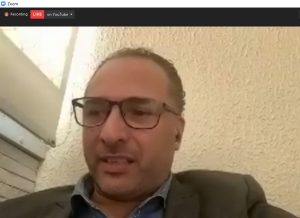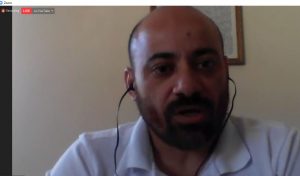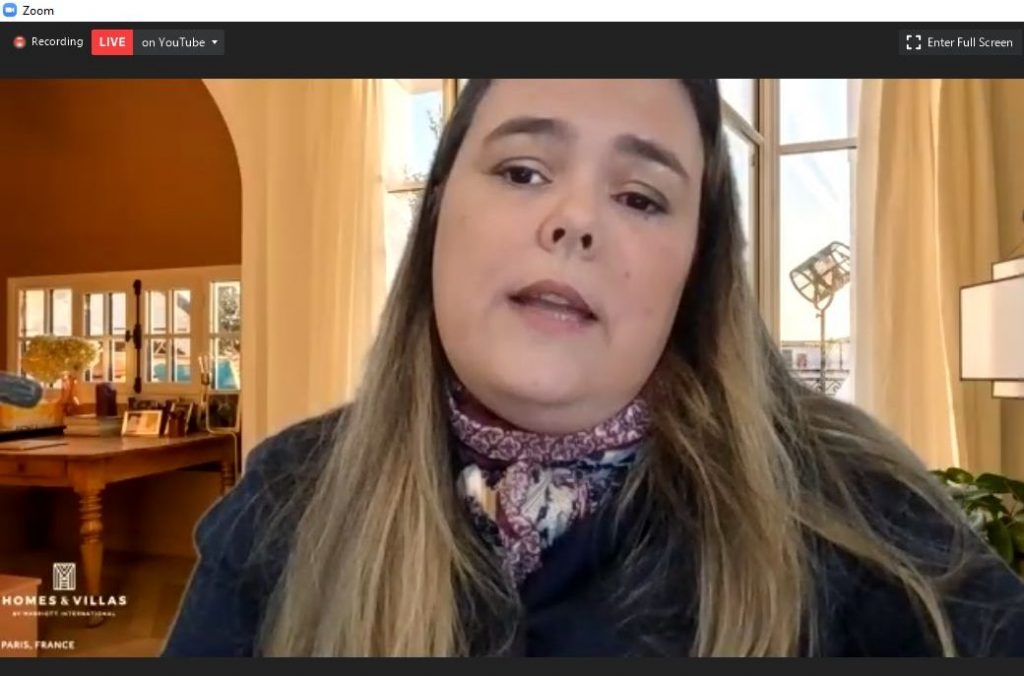São Paulo – Mariott Hotels Brasil is making a series of adjustments in its operations to serve the new consumer profile that the post-pandemic world will see. The actions are coordinated with what the chain has done globally, and some of them were presented by Marriott Brasil sales and marketing director Nina Mazziotti (pictured above) in a webinar hosted by the Arab Brazilian Chamber of Commerce on Wednesday (20), which was attended by 600 people.
Mazziotti said that Marriott created a global cleaning council made up by renowned scientists in food microbiology, infectious diseases, food and health safety, hotel and management, thinking about the change in the behavior of the consumers, who will raise their hygiene and cleaning standards due to the novel coronavirus. “We want to assure our clients and employees that this is our focus and our priority,” the director said in the web conference.
The measures to deliver hotel services after the pandemic include the use of advanced UVC technologies to clean keys and other devices shared by guests, as well as electrostatic pulverizers to disinfect rooms and common areas like lobbies and gyms.

The rooms’ amenities will include tissues for personal cleaning. In addition, there will be distancing signs, new divisions in the reception area, masks and gloves available to guests, hygiene measures at the hotel entrances, elevators and other common areas. Doing check-in and asking for room service by the phone, which was already offered will keep strong.
Mazzioti said that the hotel is hosting hybrid event – part online and part onsite. “It’s online but needs a physical support, with few people in the event space in the hotel,” she says. In that case, even the food of the event is delivered to the participants’ homes. She mentions the pharmaceutical industry, which needs to train its sellers, as users of the sector.
The Mariott chain has 7,500 hotels around the world, in 131 countries, including 14 in Brazil. The director says that the blunt of the crisis started being felt in early March, and that the first focus of the actions were the guests, investors and employees; The chain has taken measures such as cutbacks and remote work. The business saw a 90% decrease in Brazil, with hotels welcoming mostly people in essential trips, such as industry executives.
After the scare, Mazzioti says that the chain started adopting measures such as creating special rates for healthcare professionals and more flexible rules for booking cancelations. The sales and marketing director says that the negotiations of contracts of events and congresses that will longer take place were overall positive and that most were rescheduled.
According to Mazziotti, in China the hotels restarted with a 15% occupancy rate, and now they are at 30%. We believe that, in this recovery, besides the essential trips, the bulk of the demand will be local, regional, from Brazil to Brazil,” she says. She believes that everything will pick up in the third quarter. “But the only thing we know for sure is that we are not sure at all about how it is going to be from now on.”

Arab Chamber secretary-general Tamer Mansour, who moderated the discussions together with the entity’s president Rubens Hannun, made suggestions to Mazziotti, putting himself in the place of the businesspeople that will need accommodation. “The businesspeople need to feel at home in the hotels. Everybody is saying ‘stay home,’ so those who need to work and find an accommodation will have to stay at a hotel chain that can make sure that he will be at home, with total safety,” he said.
Travel Plus CEO Renato Aureliano talked about his company’s experience in the pandemic. The agency focuses on corporate trips and saw a 90% decline in revenue. “We are having a small demand, only from professionals of some companies who are traveling now because they need to do businesses in Brazil, in logistics and construction,” Aureliano said. The company has reduced the workload and the working hours and hasn’t laid off any of its 28 employees. “With this 10% we can pay the fixed costs, maintaining some cash flow. We’ve bee extremely careful and will get through this,” he said.
The webinar also featured KPMG market leader André Coutinho, Baker & McKenzie Habib Al Mulla partners Tarek Saad and Pietro de Libero, Veirano Advogados partner Fábio Amaral Figueira, and Arab Chamber legal director William Abid Dib Jr. The Baker & McKenzie Habib Al Mulla executives talked from the United Arab Emirates. Simultaneous translation was available into Brazilian Portuguese and English, and the event was attended by an audience from Brazil and elsewhere, especially the Arab countries.
Check out other ANBA stories below on the webinar and watch the full conference on YouTube.
Contracts must now include a pandemic clause
Companies must create recovery plans
Translated by Guilherme Miranda




